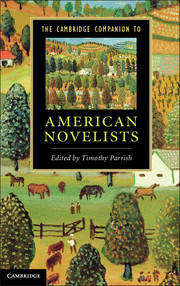Book contents
- Frontmatter
- Contents
- Contributors
- Introduction
- 1 James Fenimore Cooper
- 2 Nathaniel Hawthorne
- 3 Herman Melville
- 4 Harriet Beecher Stowe
- 5 Mark Twain
- 6 Henry James
- 7 Edith Wharton
- 8 Theodore Dreiser
- 9 Willa Cather
- 10 F. Scott Fitzgerald
- 11 Ernest Hemingway
- 12 William Faulkner
- 13 Henry Roth
- 14 Djuna Barnes
- 15 Zora Neale Hurston
- 16 Richard Wright
- 17 Raymond Chandler
- 18 Ralph Ellison
- 19 J. D. Salinger
- 20 Patricia Highsmith
- 21 Vladimir Nabokov
- 22 Jack Kerouac
- 23 Saul Bellow
- 24 Kurt Vonnegut
- 25 John Updike
- 26 Thomas Pynchon
- 27 Toni Morrison
- 28 Philip Roth
- 29 Don DeLillo
- 30 Cormac McCarthy
- Guide to Further Reading
- Index
- References
29 - Don DeLillo
Published online by Cambridge University Press: 05 December 2012
- Frontmatter
- Contents
- Contributors
- Introduction
- 1 James Fenimore Cooper
- 2 Nathaniel Hawthorne
- 3 Herman Melville
- 4 Harriet Beecher Stowe
- 5 Mark Twain
- 6 Henry James
- 7 Edith Wharton
- 8 Theodore Dreiser
- 9 Willa Cather
- 10 F. Scott Fitzgerald
- 11 Ernest Hemingway
- 12 William Faulkner
- 13 Henry Roth
- 14 Djuna Barnes
- 15 Zora Neale Hurston
- 16 Richard Wright
- 17 Raymond Chandler
- 18 Ralph Ellison
- 19 J. D. Salinger
- 20 Patricia Highsmith
- 21 Vladimir Nabokov
- 22 Jack Kerouac
- 23 Saul Bellow
- 24 Kurt Vonnegut
- 25 John Updike
- 26 Thomas Pynchon
- 27 Toni Morrison
- 28 Philip Roth
- 29 Don DeLillo
- 30 Cormac McCarthy
- Guide to Further Reading
- Index
- References
Summary
Near the conclusion of Don DeLillo’s (1936–) first novel, Americana (1971), the twenty-eight-year-old New York television executive David Bell thumbs a ride “somewhere in Missouri” from a “paleolithic lavender Cadillac” that will drive him over the hardscrabble hills and deserts of the Southwest to a makeshift commune of free-love hippies living with a breakaway tribe of Apaches in a shallow valley of sagebrush. “We want to cleave to the old things. The land. The customs. The words. The ideas,” they tell Bell, who in the weeks since he left the city is unshaven and bedraggled (A, 358). Bell’s westward journey is a well-traveled road in American literature, a flight from the trappings of civilization made famous by Huckleberry Finn’s promise at the end of Twain’s iconic novel to “light out for the Territory” for “howling adventures amongst the Injuns.” Dissatisfied with the petty affairs and cubicle conformity of corporate life, Bell is the latest in a long line of restless American seekers, though he does not know exactly what he is looking for except a way to formulate “links” that will lead him to the “nation’s soul.” But he knows he ultimately will not find them in the earnest but conspiratorially minded community of societal castoffs for whom the Apaches are a romantic metaphor for life lived off the “big government” grid (A, 358). With its huts “arranged in no discernible pattern” and no “village square or center” to speak of, the commune is an unwitting example of – rather than a solution for – the post-1960s’ social disorder in a wounded country that has lost its bearings and its sense of national purpose (A, 354).
- Type
- Chapter
- Information
- The Cambridge Companion to American Novelists , pp. 290 - 300Publisher: Cambridge University PressPrint publication year: 2012

